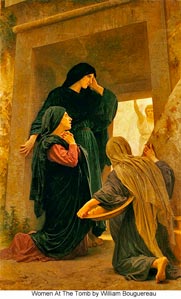Easter. Holy yet hallmarked, bewildering and baffling, yet quite clear, we celebrate it with symbols of new life: butterflies, lambs chicks and eggs, mutated into pink marshmallowed Peeps and chocolate-covered peanut butter bunnies. Resurrection is behind and under it all. But what does that mean for us today? For you? Me? In the wake of terrorism? In the trepidation of our election cycle? In the uncertainty of daily life?
The passion of resurrection is told neither in a metaphysical treatise, nor an ontological argument, but through story, witness and narrative. Defeated in their hopes and dreams, the women come after the Sabbath to do what one does, to anoint and prepare the body for burial, to sit Shiva, to say goodbye, to sit in and with the despair of the limitations of human existence.
In the ultimate place of despair: the grave – they encounter a suddenly appearing young man. Is it an angel? A spiritual vision? A young man? It’s both unclear and vague. But the appearing presence tells of a radical deliverance by the power of God. The dead one is not there. He has risen. He has gone before them, and us…even now. Look for him where you first encountered and came to know him: in the region of Galilee.
This presence is like that of the three strangers arriving at the tent of Abram and Sarah, the voice from the burning bush in the desert that propels Moses to a new destiny, the mysterious man in the fiery furnace with Shadrach, Meshack and Abendengo, the wisdom spoken at just the right time to Esther as the Jews faced genocide, the deafening silence of peace heard by Elijah outside the cave, the word that came upon Jeremiah, burning his lips, consecrating him to a prophetic life from his genesis.
Fear and trembling, terror and reverential silence are the responses to the encounter of the Divine. Abraham is speechless and paralyzed at the experience of God’s presence, Moses’ stubborn fear melts away, the emperor of Babylon trembles before the miraculous God-given survival of Shadrach, Meshack, Abendego and Daniel. Ruth stays faithful in famine, Mary is called to be the mother-of-God. The women, encountering the awe-some power of the almighty know neither what to say, nor what to do. They’re instructed to return to the beginning, to return to zero, to look anew at what they thought they’d know, seen, heard and received. Their world is turned upside down. What they thought they knew, was not just wrong, but besides the point. It’s a re-birthing of their hope, a re-formation of their understanding, a resurrection of their life.
Questions for Going Deeper:
- What do you think is the message of these scriptures?
- How have you experienced it as truth in your life?
- What invitation do you hear from God in this text to act, say, be or do?
